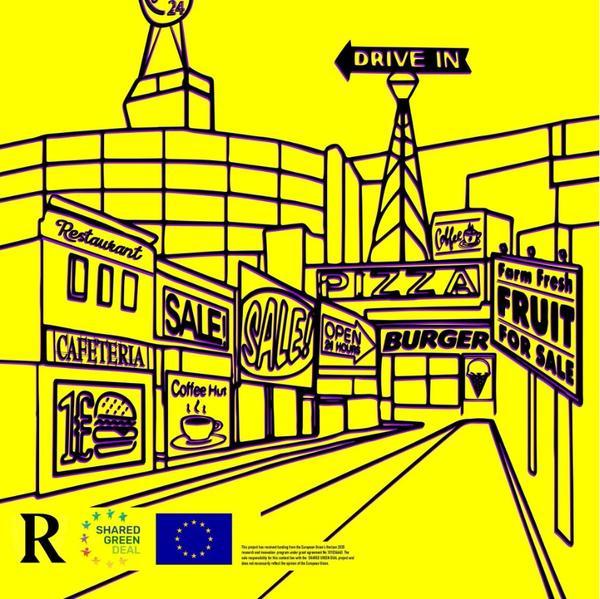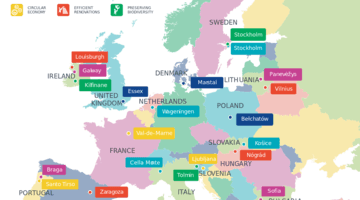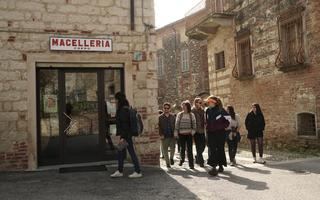Stockholm food environment
Summary of the local experiment
This local experiment is set out to produce actual policy change in the Food Environment of Stockholm. By working with the group of local changemakers following the assembly structure of DRIFT, Reformaten will inform the SHARED GREEN DEAL project with our local narrative of problems, solutions, and pathways to getting there. While producing our own policy recommendations and advocacy work with leeway from the coming strategic area of food environment of the Farm to Fork (F2F).
Local context
The metropolitan area of Stockholm consists of 26 municipalities. Amid these municipalities, economic-social-health polarization is a considerable challenge. Stockholm is a segregated city, and this reality is not taken into consideration when ambitious climate plans for the region are being put forward. The truth is that regardless of how efficient food waste policies or pathways to net-zero emissions the city presents, Stockholm is unequal with vast health differences in relation to where you live.
Specific needs and challenges
The Swedish public health authority states that it's urgent to gain knowledge about what the food environment looks like to slow down the development of overweight, obesity, and, ultimately, inequality. The food environment as a policy area can be a transformative pathway for our food system - connecting inspiring grassroots solutions in Stockholm. The public health authority further shows how socio-economically disadvantaged areas of Stockholm to a greater extent are exposed to advertising of nutrient-poor food, and that obesity is more common in this group. Behavioral, social, and cultural dimensions are not taken into account by current food policies. Lately, Reformaten published a report demonstrating how the majority of parties are unwilling to politically intervene in food environments, Reformaten concluded that this was partly due to ignorance of the significance of the food environment.
Detailed description of the experiment
If Stockholmers' diets were in line with dietary recommendations, the environmental footprint of food systems would be significantly reduced. Reformaten is a movement for a positive global food system - where it is easy to eat right. It is not easy to eat right in our home city Stockholm today, in fact, it's nearly impossible for many of us. We believe that, by creating a platform for the fragmented grassroots initiatives working with Stockholm's food environment, we will create a new vision that can foster transformative change. This experiment targets local policies, enforced by our existing advocacy work for political interventions of taxation and regulation in the food environment. Creating food environments via this project is the push effect that we need in Stockholm. Reformaten will use our experiment to inform local policy of the municipalities constituting Stockholm city, but simultaneously on national politics where we are already advocating for food environment interventions. The platform that this experiment allows us to be will live on as a community of changemakers able to disseminate the principles of the Farm To Fork also after the project.
Involvement of the target group
Our local partners, changemakers, come from various fields and sectors with expertise in the different aspects constituting the Food Environment as a strategic policy area. It is their involvement that will engage local policy change. An articulated goal of this project is to engage young people in the project. Our network is already dominated by young people, and we have consciously worked with changemakers outside of established and dominating civil society organizations and arenas. That is the starting point for Reformaten in this experiment, together with our ambition to collaborate with changemakers predominantly from the so-called districts with low socioeconomic status, the working group from Stockholm will inevitably be of great diversity. Our target group will include and go beyond the following actors:
- Political representatives
- Actors from the "Stockholm trio" which are the three universities Karolinska Institutet, Stockholm University, and KTH
- Regional and municipal officials working with public procurement
- Regional and municipal officials working with urban planning policy
- Regional and municipal officials working with health policy
- Other CSOs aimed at food sustainability
- Coop, ICA, Axfood
- REITAN
Partners
The local partners of the Stockholm experiment are representatives from academia, organized civil society, private and public sectors. During this experiment, Reformaten will, in collaboration with Slow Food Stockholm, produce one conference on the theme of a sustainable food environment as a matter of justice.
Additional remarks
Reformaten has produced a specific webpage for this experiment that is linked above. Over the course of the project, we will use this as an interactive platform where the narrative of our local partners will be presented.
Local partner
Reformaten
Country
Sweden
Number of inhabitants
975,500
City
Stockholm
Website/social media
Instagram: @Reformaten
Facebook: @Refromaten
LinkedIn: @Reformaten
Contact person:
Pelle Bengtsberg
Project manager
Email: pelle [at] reformaten [dot] com
JUN 2023
Start of project
JUL 2023
Confirmed and invited change makers
AUG 2023
Assembly 1
SEP 2023
Interviews
OCT- NOV 2023
Assembly 2 & 3
NOV 2023
Position paper production
JAN 2024
Assembly 4
FEB 2024
Finalise interviews
MAR 2024
End of the project
Related Green Deal Priorities
TIMELINE
Podcast: Behind the actions taken in the grassroots food movement
Speaking with local changemakers, the Slow Food Youth Network dives into what local actions are taken to drive change and how local initiatives connects with European...


CONTACT
For further details please contact co-leads Professor Chris Foulds (chris.foulds@aru.ac.uk) and Professor Rosie Robison (rosie.robison@aru.ac.uk).

This project has received funding from the European Union’s Horizon 2020 research and innovation program under grant agreement No 101036640. The sole responsibility for the content of this website lies with the SHARED GREEN DEAL HAS project and does not necessarily reflect the opinion of the European Union.


